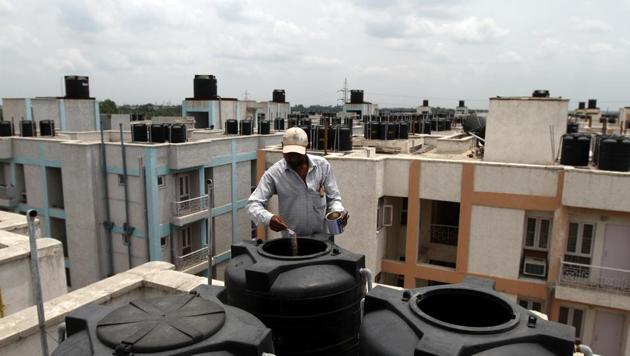Abuses, threats, tablets: A day in the life of Delhi mosquito breeding controller
Domestic breeding checkers complain that people don’t cooperate with them and often abuse them. They can’t challan people who don’t let them in their houses.
It is 9 o’ clock in the morning and the downpour has just got heavier. Sunil, a domestic breeding checker (DBC), dressed in a maroon T-shirt that he got as a uniform, stands outside a malaria office in Mehrauli.

He constantly looks at his bag in which he is carrying a tablet given by the South Delhi Municipal Corporation. The South corporation had recently launched an application named VBDC (vector-borne disease control) and given 200 tablets to breeding checkers so that senior officials can track their visits in different areas.
After getting his attendance registered, Sunil leaves for Kishangarh village, which is about three kilometres from the office. Juggling with a torch and the tablet as he checks the cooler of one Shyam Kumar in the village, he asks, “Why don’t you flush out the water, I reminded you last time too.”
“We are still new to the technology, so it is difficult for us to check more than 35 houses a day,” says Sunil, who has been given the task to check breeding of mosquitoes in 50 houses everyday. “We do not mind using a tablet, but there are greater concerns that needs to be addressed first,” he says.
Sunil says he is concerned about the lack of insurance cover if he meets with an accident. “The breeding checkers have to work in dangerous circumstances like climbing the rooftops to check for breeding in water tanks. Sometimes, there are no staircases to reach there. With a tablet in hand, it is even more difficult,” he said.
“There have been several incidents when people fell from rooftops, but the corporation didn’t pay for their treatment. We had to pool in money,” Sunil said.
Like Sunil, most of the DBC workers said that the corporation is busy promoting technology, but has been ignoring the basic facilities they need.
Several DBCs said that residents, especially those living in gated colonies, do not allow them to enter their homes. There had also been reports of them being beaten up.
A breeding checker, who works in Mohan Garden, said, “The biggest problem we face is that sometimes people are not willing to let us inside their homes. They often tell us that we should focus on cleaning the drains instead of checking breeding inside houses. They do not fear us.It would have been better if we were given hand-held devices through which we could issue challans to people who do not allow us to check their homes,” he said.
Presently, the DBCs do not have the power to issue challans. Breeding checker Surender Sharma said they sometimes get beaten up for challaning people. “Some threaten us with political connections,” he said.
Sharma too reiterated that checking around 50 houses a day is difficult. “We have to check around 50 houses everyday, which is a difficult task. It would have been better if more people were employed.”
The city requires at least 15,000 DBCs to inspect the houses every week. The current strength, however, is around 3,500.
Stay updated with all top Cities including, Bengaluru, Delhi, Mumbai and more across India. Stay informed on the latest happenings in World News along with Delhi Election 2025 and Delhi Election Result 2025 Live, New Delhi Election Result Live, Kalkaji Election Result Live at Hindustan Times.
Stay updated with all top Cities including, Bengaluru, Delhi, Mumbai and more across India. Stay informed on the latest happenings in World News along with Delhi Election 2025 and Delhi Election Result 2025 Live, New Delhi Election Result Live, Kalkaji Election Result Live at Hindustan Times.





